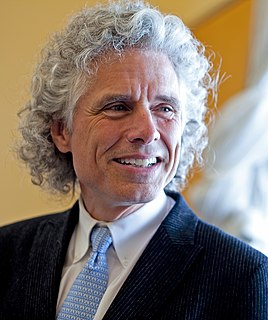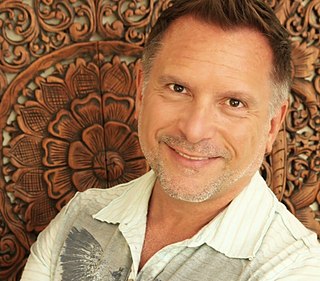Related Research Articles

Steven Arthur Pinker is a Canadian-American cognitive psychologist, psycholinguist, popular science author and public intellectual. He is an advocate of evolutionary psychology and the computational theory of mind.

Leadership, both as a research area and as a practical skill, encompasses the ability of an individual, group or organization to "lead", influence or guide other individuals, teams, or entire organizations. The word "leadership" often gets viewed as a contested term. Specialist literature debates various viewpoints on the concept, sometimes contrasting Eastern and Western approaches to leadership, and also North American versus European approaches.

Stephen Richards Covey was an American educator, author, businessman, and keynote speaker. His most popular book is The 7 Habits of Highly Effective People. His other books include First Things First, Principle-Centered Leadership, The 7 Habits of Highly Effective Families, The 8th Habit, and The Leader In Me: How Schools and Parents Around the World Are Inspiring Greatness, One Child at a Time. In 1996, Time magazine named him one of the 25 most influential people. He was a professor at the Jon M. Huntsman School of Business at Utah State University at the time of his death.

George Elton Mayo was an Australian born psychologist, industrial researcher, and organizational theorist. Mayo was formally trained at the University of Adelaide, acquiring a Bachelor of Arts Degree graduating with First Class Honours, majoring in philosophy and psychology, and was later awarded an honorary Master of Arts Degree from the University of Queensland (UQ).

Henry Shakespear Stephens Salt was an English writer and campaigner for social reform in the fields of prisons, schools, economic institutions, and the treatment of animals. He was a noted ethical vegetarian, anti-vivisectionist, socialist, and pacifist, and was well known as a literary critic, biographer, classical scholar and naturalist. It was Salt who first introduced Mohandas Gandhi to the influential works of Henry David Thoreau, and influenced Gandhi's study of vegetarianism. Salt is considered, by some, to be the "father of animal rights," having been one of the first writers to argue explicitly in favour of animal rights, rather than just improvements to animal welfare, in his Animals' Rights: Considered in Relation to Social Progress (1892).
George Wilson Albee was a pioneer in clinical psychology, who believed societal factors such as unemployment, racism, sexism, and all the myriad forms of exploitation of people by people were the major cause of mental illness. He was one of the leading figures in the development of community psychology. Albee was an advocate for coping with adversity, strengthening individual resources, and social change.

Christian de la Huerta is an author, public figure, spiritual and LGBTQ leader.

Jonathan David Haidt is an American social psychologist, Professor of Ethical Leadership at New York University Stern School of Business, and author. His main areas of study are the psychology of morality and moral emotions.

William C. Byham is an American entrepreneur, author and industrial/organizational psychologist.
Leadership studies is a multidisciplinary academic field of study that focuses on leadership in organizational contexts and in human life. Leadership studies has origins in the social sciences, in humanities, as well as in professional and applied fields of study. The field of leadership studies is closely linked to the field of organizational studies.

Mark van Vugt is a Dutch evolutionary psychologist who holds a professorship in evolutionary psychology and work and organizational psychology at the VU University Amsterdam, the Netherlands. Van Vugt has affiliate positions at the University of Oxford, Institute for Cognitive and Evolutionary Anthropology (ICEA).
Leader development is defined as the "expansion of a person's capacity to be effective in leadership roles and processes". These roles and processes are ones that aid in setting direction, creating alignment and maintaining commitment in groups of people sharing common work. Most organizational leadership research and educational programs have focused on developing individual-based knowledge, skills, and abilities associated with formal leadership roles of individuals. Leader development therefore results by investing in human capital.
Trait leadership is defined as integrated patterns of personal characteristics that reflect a range of individual differences and foster consistent leader effectiveness across a variety of group and organizational situations. The theory of trait leadership is developed from early leadership research which focused primarily on finding a group of heritable attributes that differentiate leaders from nonleaders. Leader effectiveness refers to the amount of influence a leader has on individual or group performance, followers’ satisfaction, and overall effectiveness. Many scholars have argued that leadership is unique to only a select number of individuals and that these individuals possess certain immutable traits that cannot be developed. Although this perspective has been criticized immensely over the past century, scholars still continue to study the effects of personality traits on leader effectiveness. Research has demonstrated that successful leaders differ from other people and possess certain core personality traits that significantly contribute to their success. Understanding the importance of these core personality traits that predict leader effectiveness can help organizations with their leader selection, training, and development practices.

Ángel Cabrera Izquierdo is the 12th and current President of the Georgia Institute of Technology. Previously, he served as the President of George Mason University and of Thunderbird School of Global Management, and the former dean of IE Business School. His scholarship includes work on learning, management and leadership.

Tomas Chamorro-Premuzic is an organizational psychologist who works mostly in the areas of personality profiling, people analytics, talent identification, the interface between human and artificial intelligence, and leadership development. He is currently a professor of business psychology at University College London (UCL) and an adjunct professor at Columbia University, as well as the Chief Talent Scientist at ManpowerGroup, and was previously the CEO at Hogan Assessment Systems.
Professor Peter K Smith is Emeritus Professor of Psychology at Goldsmiths College, University of London. His research interest is children’s social development. Smith was Head of the Unit for School and Family Studies in the Department of Psychology at Goldsmiths from 1998 to 2011. He received his B.Sc at the University of Oxford and his Ph.D. from the University of Sheffield; following his doctorate he continued at the University of Sheffield, obtaining a Personal Chair in 1991, before moving to Goldsmiths College in 1995. He is a Fellow of the British Psychological Society, the Association of Psychological Sciences, and the Academy of Social Sciences.
Philip Michael Podsakoff is an American management professor, researcher, author, and consultant who held the John F. Mee Chair of Management at Indiana University. Currently, he is the Hyatt and Cici Brown Chair in Business at the University of Florida.
Alan Briskin is an American sociologist. He is an adjunct professor at Saybrook University.

Herman Aguinis is a researcher and business professor and author. He is the Avram Tucker Distinguished Scholar, Professor of Management, and Chair of the Department of Management at the George Washington University School of Business in Washington, D.C. He has been ranked among the top 100 most influential economics and business researchers in the world every year since 2018. He has been elected for the presidency track of the Academy of Management (AOM), served as AOM Vice President and Program Chair for the 2020 virtual conference including about 7,200 participants from 90 countries, and is serving as President during 2021-2022. Prior to moving to Washington D.C. in 2016, he was the John F. Mee Chair of Management and the Founding Director of the Institute for Global Organizational Effectiveness in the Kelley School of Business at Indiana University.
Robert Louis Kahn was an American psychologist and social scientist, specializing in organizational theory and survey research, having been considered a "founding father" of the modern approach to these disciplines. He has also been involved in developing studies on aging and his work is critically acclaimed by experts.
References
- ↑ https://www.familysearch.org/ark:/61903/1:1:KTVZ-GN8 [ bare URL ]
- ↑ "Stephen Zaccaro". Google Scholar. Archived from the original on December 12, 2013. Retrieved December 9, 2013.
- ↑ "Stephen Zaccaro". George Mason University. Retrieved December 9, 2013.